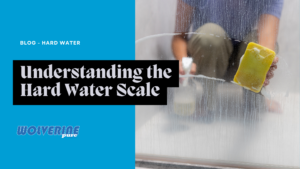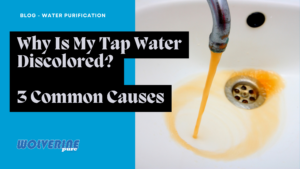Knowing what’s in your home’s water is the first step to making sure it’s clean and pure. You can schedule a free in-home water test with our Wolverine Water experts anytime. But there are also many home-test kits available in local hardware stores. If you’ve recently tested your water by yourself at home, here is some guidance for interpreting the results.
Hardness
Many in-home water tests measure the hardness, or mineral content of your water. Hard water is typically not harmful to your health but can cause a plethora of other unpleasant problems in your home. Anything over 7 grains per gallon is considered hard water. Most people find water at 10.5 hardness to be objectionable. While these are helpful guidelines for assessing the hardness of your home’s water, consider these numbers alongside your own daily experience of your home’s water. If you notice spotty dishes, build-up on your faucets and fixtures, or dingy laundry, consider getting your hard water taken care of sooner rather than later.
Our whole-home Blue Line system is a great solution for hard water.
pH levels
This is an essential indicator of the purity and cleanliness of your water. Water that is too acidic (low pH) or basic (high pH) can both have impacts on your water’s purity. Water is considered neutral if it has a pH of 7, though anything between 6.5 and 8.5 is still considered within a normal pH range.
Water with a pH lower than 6.5 is too acidic, meaning it could corrode your home’s pipes and introduce metals and contaminants into your water. This will result in a metallic taste or a “slippery” feeling of your water.
Water that is basic, or has a pH above 8.5 contains many minerals and is considered hard water. These minerals cause nasty build-up, reduced flow and, if left untreated, long term damage to your appliances, fixtures and plumbing. In addition, water with a high pH often has a bitter taste due to the additional minerals.
Our Blue Line whole home systems and Reverse Osmosis with Alkaline systems can help regulate the pH of your home’s water.
Bacteria
Many kits designed for well water will test for the presence of bacteria. Bacteria can enter your well water through contamination of your groundwater or at another point in your water’s journey. Most often, at home water tests will perform basic checks for coliform bacteria. While not all bacteria are harmful to your health, some can cause gastrointestinal illness.
Our Whole House Carbon Filter is a good choice for well water that is at risk for bacteria contamination.
PFAS
Home water test kits that you buy at the store cannot adequately test your home’s water for PFAS. The state of Michigan has a list of certified laboratories who can test a sample of your home’s water for PFAS. If your home’s water sample shows signs of PFAS, our PFAS Removal System can help remove the contaminants from your water.
Need more guidance? We’re always here to help. Give us a call today.




